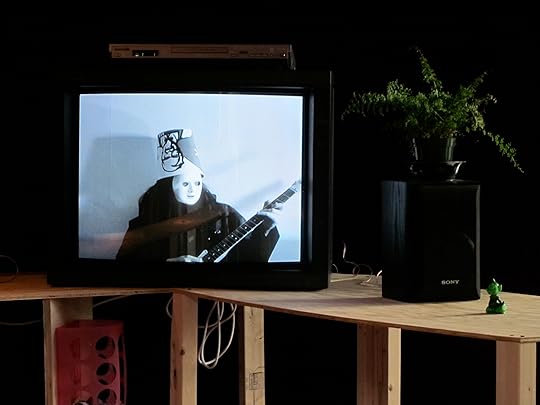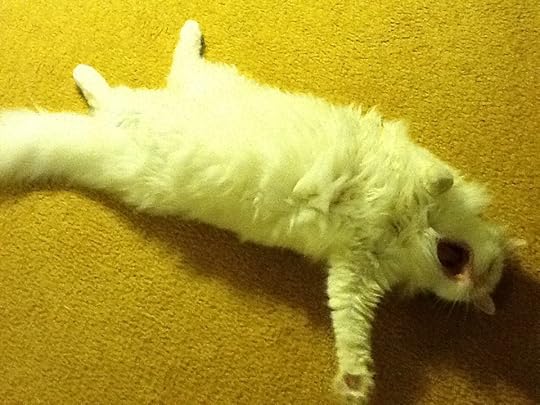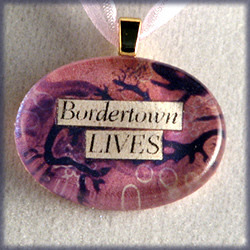Christopher Barzak's Blog, page 6
January 19, 2012
Turning Points
This post is short, but I wanted to point any of my readers over to the blog of writer Nova Ren Suma (author of the fantastic novel, Imaginary Girls), where I've guest blogged in Nova's Turning Points series.
My turning point: turning from writing the short story to the novel, and then from the novel to a novel-in-stories.
There's also a giveaway for copies of both of my books, so do leave a comment to be entered!








December 19, 2011
Taking Stock: 2011
Well, it's that time again. End of the year and all. Every year I try to write down the various things I've done–written, published, won, been nominated for, sold for the future, etc–and lay it out like I might in a proper journal. It's been a while since I've kept a proper journal, but most likely those who read this can tell I pop up regularly when university is not in session, and when it is in session…well, I'm usually up to my ears with work to sit down and gather my thoughts about myself and what I'm working on (or wishing I could be working on) as easily.
Still…I am on break (even though I need to write a loooooong document narrating just why exactly I should be tenured next year–still pretending I don't have to do that for another day or two) and will take the time instead to write this, for myself.
This past year I published four short stories, each of which presented their own challenges, some due to the genre necessary to work within, some because I did that thing where I followed a voice–one line alone that set me going–and chased it until the end. Which is a difficult and challenging sort of story to write, because you have to trust your instincts instead of toying with your knowledge of a particular genre and its conventions–that has its own challenges, but uncertainty is generally not one of them, because you have those conventions of a particular genre there, acting as sort of guideposts to the territory those genres have conquered and the rules they've established for the conduct of their citizens.
The first story to be in 2011 arrived in the April/May issue of Asimov's Science Fiction. "Smoke City" was one of those stories I chased after, by voice alone. Here is its first paragraph:
One night, I woke to the sound of my mother's voice, as I did when I was a child. The words were familiar to my ear, they matched the voice that formed them, but it was not until I had opened my eyes to the dark of my room and my husband's snoring that I remembered the words were calling me away from my warm bed and the steady breathing of my children, both asleep in their own rooms across the hall. "Because I could not stop for death," my mother used to tell me, "he kindly stopped for me." They were Dickinson's words, of course, not my mother's, but she said them as if they were hers, and because of that, they were hers, and because of that, they are now mine, passed down with every other object my mother gave me before I left for what I hoped would be a better world. "Here, take this candy dish." Her hands pushing the red knobbed glass into my hands. "Here, take this sweater." Her hands folding it, a made thing, pulled together by her hands, so that I could lift it and lay it on the seat as my car pulled me away. Her hand lifted into the air above her cloud of white hair behind me. The smoke of that other city enveloping her, putting it behind me, trying to put it behind me, until I had the words in my mouth again, like a bit, and then the way opened up beneath me, a fissure through which I slipped, down through the bed sheets, no matter how I grasped at them, down through the mattress, down through the floorboards, down, down, down, through the mud and earth and gravel, leaving my snoring husband and my steadily breathing children above, in that better place, until I was floating, once more, along the swiftly flowing current of the Fourth River.
"Smoke City" was written after I'd read a bottom-up history of Pittsburgh, Pennsylvania called The Point of Pittsburgh, by Charles McCollester, which began at its geological foundations and moved forward to the present. I read all 500 pages in a couple of nights, and because I took it in so quickly, I began to dream about the history of the place, but in that typically surrealist fashion that dreams take on. I was mostly caught up with the Guilded Age, when the steel industry had both made the place wealthy and ruined at the same time. The depiction of the city was mostly in line with what many imagine Hell to look like. And while I was reading it, I kept thinking, this is the same time period that Steampunk often settles in, but most steampunk stories and books I've read seem to revolve around the lives of movers and shakers, people in power or who have access to power, rather than those on the bottom, toiling for others. "Smoke City" came out of meditating on our connections to that period of time. The writer Paul Cornell (of Dr. Who fame!) called it "a furious critique of Steampunk." Thank you, Mr. Cornell!
The second story was "Gap Year" in the Ellen Datlow/Terri Windling edited anthology, Teeth. This was also a voice oriented piece for me, but because the anthology was dictated by the genre of vampire stories, and vampire stories specifically in the category of YA fiction, I had a lot of those guideposts I mentioned earlier to work with. Working within particular genres and within particular age categories does create a certain amount of things to push off from, or interact with. You know the type of story you're telling, and even if it's as diverse as vampire fiction is, it's all still there to work with: you're not creating out of a void, you're not following a voice and hoping it leads you to gold instead of nowhere. Here's the first paragraph of "Gap Year":
When the vampires came to town, there was an assembly in the high school gymnasium. Retta and Lottie sat next to each other on the bleachers, like they did every day in study hall, their hands folded between their pressed-together knees. The three vampires who stood on the stage had something to tell them. "We're people, too," said the head vampire, if that's what you call a vampire who speaks for other vampires. He couldn't have been more than eighteen. A splash of freckles on his face. Mousy brown fauxhawk. A tight, too-short Pixies concert t-shirt showing off a strip of skin above the waistband of his boxers. He wore jeans with a snakeskin belt hanging loose in the loops. If you saw him in the hallway, you wouldn't suspect him of being a vampire. Retta and Lottie weren't sure if they suspected him of being a vampire now, even though he said he was.
You can probably tell that the voice of this piece is just a tad bit ironic. I think I went for the ironic voice because so much YA vampire fiction takes itself sooooo seriously, to the degree that it sometimes hurts to read it. And also because a lot of vampires in vampire fiction have seemed to have lost their sense of danger, and can come out in the daytime nowadays, I thought they'd lost a bit of their allure (for me). So I began writing a story where vampires are out, and fairly boring to the rest of society. Until Retta, the heroine of the story, discovers what being a vampire can mean for herself.
That's the fun part of working within established genre conventions: finding ways to twist what's already there, to write against the grain instead of with it, looking for something new.
The third story of the year appeared in Holly Black's and Ellen Kushner's anthology Welcome to Bordertown. The anthology is a reintroduction to the Bordertown world created by Terri Windling in the 80s and 90s for the new generation. I was thrilled to be invited to write in this world, as it was one I entered into with great excitement as a teen reader. The writing process for this story is somewhat related to how I went about writing "Gap Year". Instead of working with a particular genre and its conventions, however, working in Bordertown provided me with the conventions of a particular world to write within. And with any world, there are rules and regulations. They can be broken, or twisted, of course, but you have to know them in order to break and twist them. When it came to writing this story, I wanted to approach some of the aspects of the race and class strife that was always part of the ambient energy in Bordertown–creatures of the fae world living side by side with humans, and those born of the relationship between the fae and humans–in a fairly direct way. So I created the character of Marius, a late teen from the human world who came to Bordertown several years before the "Way" between Bordertown and the World closed off. So any potential for him to return to the life he fled–rejection from his family after coming out to them–was closed off as well. When the Way reopens, all sorts of newcomers from the World arrive, and one of them is Aleksander (or "Mouse" as he comes to be called), a young man who is ready to take on Bordertown and its various social ills almost like an Occupy Wallstreeter. Here's the first paragraph:
I saw him again tonight, while out walking the streets of Soho: Alek or Aleksander, whatever it is he's called now. He's had plenty of names since I first knew him when he arrived almost a year ago, fresh and green from the World. One of the newcomers after the Way reopened. Mouse. Alek. Aleksander. Voice of the Nameless, voice for those who drink from the river whose waters curse them to return to it daily to forget their troubles, those who came and didn't find what they'd been told would be a glorious place free of the World's restrictions, where they could be themselves more than anywhere and wouldn't have to fight for it.
Right.
Clearly, Marius is a bit jaded and cynical. But he has a happier ending than the one he expects.
Finally, the last story of the year appeared in Apex Magazine. "The 24 Hour Brother" is, as reviewer Lois Tilton described it, "A strange and sad fantasy of children whose lives are like mayflies." It's the story of Lewis, fifteen years old, whose mother gives birth to his little brother, Joe, who grows up and goes through the various phases of life all within 24 hours. Here's the opening:
My little brother Joe grew up too fast for his own good. My mom was the first to see what we were in for. Soon after Joe's birth, when the nurse put him in her arms, the first thing he did, still pink and slimy, was smile the gummy, wry smile of a little old man.
"Joseph, Joe, my baby boy," said my mother, "we'll try our best if you will." She kissed his cheek and handed him back to the nurse, trying to keep herself from falling in love with someone who she realized, at their very first meeting, would only break her heart. The first sign was in that first smile: the old man Joe would soon become, the old man Joe would become too soon.
This is a story more in line with "Smoke City". A story in which I create my own world, follow the voice of the narrator, and found my way through based on the rules I was making for myself.
That's it for publications this year. My story "Map of Seventeen" was nominated last spring for the Nebula Award for Best Novelette, which means I've been nominated for a Nebula three times now. I can no longer say "Third time's a charm!" unless I adopt a sarcastic tone of voice. 
Right now, I'm looking forward to putting 2011 behind me, and working into the future. 2012 and beyond.
Happy holidays, and happy New Year.








December 12, 2011
New Music Crush
Robyn is weird. I barely remember her former early 90′s self, which was largely forgettable over-produced, mediocre dance music/love ballads that sounded like the dance music/love ballads of the time. But thanks to the most recent episode of Saturday Night Live, I was turned on to Robyn's reinvented contemporary self, and she made some really cool choices. She still is a pop dance type, but she's a totally weird diva, instead of trying to fit in. This is probably made more possible by the Coming of Gaga, but after obsessively reading interviews with Robyn, this sound and look was a long time in coming. I look forward to listening to all three parts of her 2010 triptych, Body Talk.
Try out a few other songs after this one: Indestructible, Call Your Girlfriend, and Be Mine (the Nobel Convention performance of this last one is fantastic).








December 11, 2011
Attack of the Killer Collections
Every year around this season of gift giving, I see lots of posts by writers and readers and online stores, advising people what books would make great gifts. Usually, these lists consist entirely of novels. I'm a big fan of novels, but I might be an even bigger fan of short story collections. But even I can be swayed by novel-fever, and in the past (not the recent past, but back when I did blog regularly past), even I've recommended buying novel A and novel B, etc. This year, I'm recommending three killer short story collections that I've read in 2011. Of course they're all published by small presses, because the large press publishing industry has this idea that people don't want to read short story collections. I think that's a bit of a self-fulfilling prophecy, but that's another blog post. For now, here's my advice: buy these three collections. They're awesome, and they each have killer covers.
Collection A: After the Apocalypse, by Maureen F. McHugh
 Maureen McHugh is well known in science fiction circles, mainly in the circles that admire high quality, character centered scifi. Back in the 90s, she debuted with a hugely awesome novel-in-stories (before that term was conceived of) called China Mountain Zhang (read that book, too!). She went on to write a number of other novels, and one other collection (Mothers and Other Monsters, also recommended), and has been spending time writing Alternate Reality Games and is now writing film scripts. So the scifi short story world is always very eager to read when a story of hers appears. This collections revolves thematically around the idea of apocalypses, endings, both literal and metaphorical, both in the epic scifi sort of way, and in the ordinary individual's self-implosion sort of way.
Maureen McHugh is well known in science fiction circles, mainly in the circles that admire high quality, character centered scifi. Back in the 90s, she debuted with a hugely awesome novel-in-stories (before that term was conceived of) called China Mountain Zhang (read that book, too!). She went on to write a number of other novels, and one other collection (Mothers and Other Monsters, also recommended), and has been spending time writing Alternate Reality Games and is now writing film scripts. So the scifi short story world is always very eager to read when a story of hers appears. This collections revolves thematically around the idea of apocalypses, endings, both literal and metaphorical, both in the epic scifi sort of way, and in the ordinary individual's self-implosion sort of way.
Cover comment: Fantastic design that makes the book look old and battered, but isn't in fact. Very cool.
Collection B: Unpossible, by Daryl Gregory
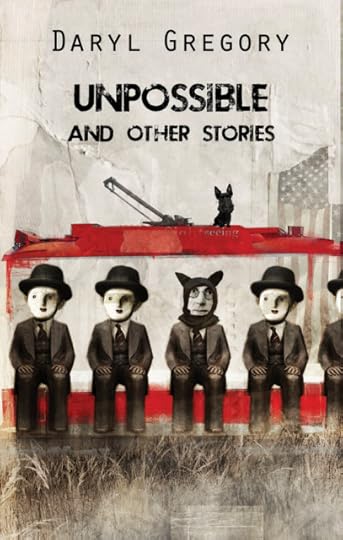 Daryl Gregory and I won the same award (the Crawford Award) for best first fantasy book. Different years, of course! His first novel, Pandemonium, reminded me of a newish, leaner, sometimes scarier (is that possible? or unpossible?) Stephen King. His follow-up novels were just as good as the first, but I'd never read any of Daryl's short stories until this collection came out from Fairwood Press last month. The stories range from good to great, and a couple are straight-up knockouts. Really idea-oriented speculative fiction that doesn't lose sight of its characters and the human drama unfolding around them.
Daryl Gregory and I won the same award (the Crawford Award) for best first fantasy book. Different years, of course! His first novel, Pandemonium, reminded me of a newish, leaner, sometimes scarier (is that possible? or unpossible?) Stephen King. His follow-up novels were just as good as the first, but I'd never read any of Daryl's short stories until this collection came out from Fairwood Press last month. The stories range from good to great, and a couple are straight-up knockouts. Really idea-oriented speculative fiction that doesn't lose sight of its characters and the human drama unfolding around them.
Cover Comment: Fantastic. This is a wonderfully weird piece of art. If Gregory's previous books hadn't already sold me on him in general, I would have bought this book for the cover alone (yes, I'm one of those sorts).
Collection C: Sleight of Hand, by Peter S. Beagle
 Does Peter S. Beagle really need an introduction? Probably for some. Can't I just say, The Last Unicorn, and leave it at that? (And if you haven't read The Last Unicorn, do yourself a favor and get it too).
Does Peter S. Beagle really need an introduction? Probably for some. Can't I just say, The Last Unicorn, and leave it at that? (And if you haven't read The Last Unicorn, do yourself a favor and get it too).
Beagle has made something of a comeback in the last decade, publishing several short story collections with Tachyon Publications, and all of them bear the hallmarks of his wit, wonder, and deep sympathy for ordinary characters caught up in extraordinary fantastical events. This particular collection seems to revolve mostly around magicians, dragons, gods and enchantresses. There's light and dark both in these stories, a wide range of types of fantasy stories.
Cover Comment: Gorgeous. That is all.
Now, go forth and buy short story collections as gifts. For yourself, and for others. Because, really, collections rock, and these ones are killers.








December 6, 2011
The 24 Hour Brother
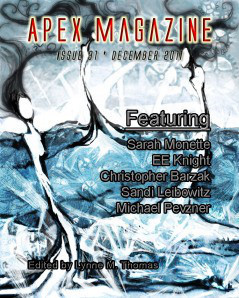 Just a heads up for interested readers: my short story, The 24 Hour Brother, is now available to read in the new issue of Apex Magazine.
Just a heads up for interested readers: my short story, The 24 Hour Brother, is now available to read in the new issue of Apex Magazine.
You can read it by clicking here.
The story is an odd one. Two things formed the story initially: one for form, one for feeling. 1.) I'd been wanting to write a story in which the life cycle of a human being was completed within a very few pages, and to hopefully, maybe, achieve some kind of emotional resonance over the occurrence despite the brevity of their stay. 2.) With that in mind, I happened to read an essay by Joyce Carol Oates in which she talks about the "life-lie" we all tell ourselves. The necessary delusion that lets us go on living as we live, doing what we do.
It's not a terribly uplifting story, I'm afraid, but I hope it resonates, even if it doesn't uplift.
Thanks for reading.








November 28, 2011
Magick for Terri
This blog is mainly just serving as a website for my work at the moment, and any big updates on what's happening in my writing life, as I rarely have time to keep it as a personal blog any longer. Here's one of those big updates I just mentioned though. Not for myself, but for someone else very special in my writing life.
Right now, there's a fundraiser for Terri Windling, who's undergoing health and legal problems at the moment. For those not in the know, Terri is one of the most influential and generous editors/artists/writers in the field of fantasy fiction, starting in the late 70s and 80s, when she introduced the concept of contemporary/urban fantasy, which is now ever so popular. She was the woman who made it happen.
She also selected my first professionally published story, "Plenty", for the Year's Best Fantasy and Horror back in 2000, and has been a champion of my work ever since. I'm donating a manuscript critique (short story or first 40 pages of a novel) to the auction to raise funds to help her in this time of need.
The auction holds tons of treasures you should check out. Stuff from Kelly Link, Catherynne Valente, Elizabeth Hand, Nalo Hopkinson, Cassandra Clare, Holly Black, Cherie Priest, Charles Vess, and many more folks who want to help Terri.
Please check it out by clicking here to go to the auction site. The spotlighted auction items are listed on the left sidebar, but there are other items up for grabs in the feed for the site, so do forget to peruse the posted items in the center of the page either.
Let's make some magic happen.
Thanks (and more from me in a couple of weeks when the fall semester is over),
Chris








August 2, 2011
A few items of summer
It's been a while since I last posted the picture of my cat screaming, and various things have occurred both before and after that, which I am aiming to catch up with and report here, in this dusty corner of the internet.
Item One: As of this summer, I have new literary representation in the very fancy domain of the Barry Goldblatt Literary Agency , with Barry Goldblatt taking up the cause of furthering the publication of books by Christopher Barzak. For years, Barry and I had circulated among a lot of the same folks, and occasionally I would hear through those same folks about how much he loved my writing, and in particular my debut novel, One for Sorrow, at which I would always blush like a school girl and wonder how could he possibly? And though we seemed to always be missing each other at conventions, when the opportunity arose for a change of representation, Barry was one of the first people to come to mind. Very happy to finally have had the chance to hang out with Barry in person at length over the past weekend, when I spent four days with him and twenty-some of his other clients at an agency retreat in southern Illinois. If you follow me on Twitter or Facebook, you might have caught me talking about owls and cats and cicadas, all of which were aplenty in that wilderness. Along with many taxidermied creatures peering out from walls and corners of the lodge.
Along with that, I had the pleasure of a guest in the writer Richard Bowes for a week or so in June, when we explored the city of Pittsburgh a bit, and also further south of Pittsburgh, went on a pilgrimage to the Frank Lloyd Wright House called Fallingwater. Here are some pictures of a.) Pittsburgh (from the very cool installation art museum called the Mattress Factory), and b.) installations within the Mattress Factory, and c.) Fallingwater:
a.) Pittsburgh
b.) Me, in an installation
b.) creepy masked musician installation
b.) cubes!
c.) Fallingwater
Another venture this summer was doing new things to the house. If you're someone who used to be a regular reader of this blog (back when I was an actual blogger and not just a irregular updater), you'll know I purchased a home several years back, and have been restoring it slowly but surely, as I can afford it. Here are some photo updates from various places in and around le maison:
Front patio
Front walk (patio hiding behind bushes)
Back patio (and new stone garden)
Various pots of things we're growing, like asparagus and onions, and purple fountain grass!
A side garden
And another of the side gardens
Front gardens (this keeps changing, depending on the month and season)
And the front of the house (new trim as of last year)
Lots of other things are afoot: novel writing, novel rewriting, story drafting, etc. One thing that I wrote this summer was a blog post for the literary journal, Tin House, which features a series of articles on independent book stores throughout the country. When asked to write one, I had few choices, as Youngstown only has one indie bookstore left in existence (as far as I know, that is, and I'm fairly certain at this point). So I wrote about Dorian Books, a place near and dear to me, which I also featured as a set piece in my novel One for Sorrow. You can click here to read my article in full.
And lastly, because I know how much so many of you like cat stuffs, I am including a short video of my cats upon receiving fish-shaped catnip holders from their grandma in Japan. Clearly, they are crazy:
Until next time, which may be a while, as August is in gear. Time to prep for classes which start in a few weeks, and to get as much writing done as possible in what's left of the summer. Cheers. I hope everyone out there is staying cool








June 27, 2011
Cat screams
I have often told my friends that my cat, Kokoro (which in Japanese means heart or mind), screams at me for things. Attention, food mostly. But also just when he feels like it, he'll just open his maw as wide as possible and let out a Tina Turner-like Big Wheels Turning-like note.
Everyone says, Yeah, yeah, whatever. He's just a cat.
Well, here is proof.
Kokoro: screaming:








May 24, 2011
The road not taken
Today is the day. Welcome to Bordertown is officially out. And today is also the day to announce the winner of the Bordertown Lives pendant Mia Nutick has so graciously offered for my contest. And the winner is: Kathy Barreca.
If you haven't taken a little dip into the contest entrant's pool in my previous post, please do. ALL of them were great, but Kathy's hooked me because of the magical device she used as her way to get to Bordertown: Robert Frost's poem, The Road Not Taken. It was simple yet totally evocative, and I think poems are magical routes to other places. Sometimes into another person's psychic landscape, and sometimes into more easily visited places.
But you should go read all of the entrants' posts because they're all good in so many different ways. One writer even has television writing credits in her background and didn't enter to win, just to participate in a round of storytelling fun, which is totally a Bordertown thing to do. 
Congratulations, Kathy. I'll be getting you in touch with Mia shortly, and congratulations to all those readers who have been eagerly awaiting the new anthology, and congratulations to the editors and writers who all had the opportunity to work on bringing the place back for a spell.








May 16, 2011
How to get to Bordertown
After thirteen years of absence in the world, Bordertown–that awesome shared world of punk rock and elves that surfaced in the 80s and 90s–is coming back. It's coming back on May 24th, to be exact, and those of us writer types who were invited to play in the new anthology have been holding contests leading up to the big event. And it is a big event. The book is big, and it's beautiful, chock full of poems and stories and even a graphic story to boot. You won't want to miss it.
For my contest, I'm asking readers of my blog to watch this book trailer for Welcome to Bordertown, and to maybe do a little research (for those who are unfamiliar with the Borderlands) to get acquainted with the place. Then, come back here and answer this one question in the comments of my blog:
How would you get to Bordertown?
It's an important question, because Bordertown is a magical place, and all magical places have to be gotten to by particular paths. Wendy and Peter go to Neverland by flying on a celestial road called the High Way. Dorothy goes to the Emerald Kingdom by following the Yellow Brick Road. Alice tumbles down the Rabbit Hole to Wonderland. In Bordertown lore, it's said that anyone wishing hard enough to be there will find a way. So what's your way, if you wanted it bad enough? How would you get to Bordertown?
I'll be picking one of the answers on May 24th, and will announce the winner here on my blog. The prize? This really cool Bordertown pendant fashioned by artist Mia Nutick:
So who's first? By hook or by crook, I expect to see some fancy travel plans.
(Don't forget to leave your name and email address in the info for comments.)












